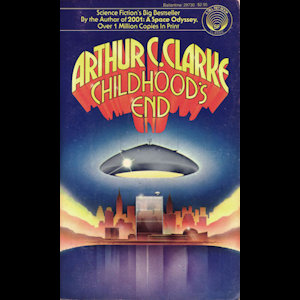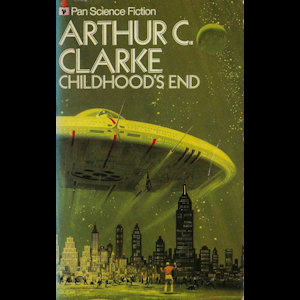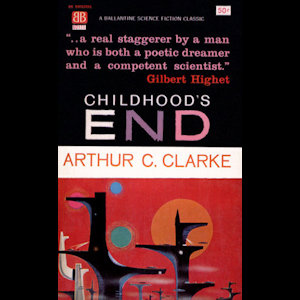The Summer of Arthur C. Clarke: Childhood's End
Before I begin, welcome to my Summer of Arthur C. Clarke. On the heels of last year's popular Slasher Summer, this year I'm leaving behind the guilty pleasure of the niche horror genre and exploring something a little closer to my own heart: namely science-fiction. Of all the sci-fi greats, none have influenced me more than the late Arthur C. Clarke, my personal favorite of the "Big Three" from the Golden Age of the genre (Asimov, Clarke, and Heinlein). This summer, I am going to look at a few of his most famous works, including the entirety of his 2001 series and the tiny handful of adaptations that have been made for film, television, and video games. Strap in and prepare yourselves for a journey into the stars and the mind, and let us never forget how much richer the world of fiction is for having been blessed by the incomparable Sir Arthur C. Clarke.
 | | This is probably my favorite cover for the book |
A fleet of alien ships appears in the skies above Earth, and the beings within quickly bring an end to war, poverty, and suffering. Not everyone trusts these new Overlords, who refuse to not only reveal their goals but also their appearance, but one thing becomes abundantly clear: their power and intelligence are far superior to our own.
Published in 1953 as one of Arthur C. Clarke's earliest novels, Childhood's End is a clever deconstruction of one of science-fiction's biggest tropes, and few other alien invasion stories stand up to its bold criticisms of the subgenre. Most tales that begin with alien ships in Earth's atmosphere end with humanity overcoming impossible odds to repel a malevolent force from beyond the stars, but Clarke takes a more practical approach, daring to question the assumption that aliens must be malevolent or that humanity could even comprehend--much less overcome--advanced alien technology.
It also toys along the edges of ideas Clarke would later expand upon in greater detail in later works--evolutionary transcendence, the space race, hints at a larger alien world beyond our comprehension, etc.--demonstrating that he spent most of his life, if not all of it, thinking about science, politics, technology, and the future. However, while there are many startlingly accurate predictions scattered within it, Childhood's End is also Clarke at his most naïvely idealistic. He imagines a bloodless end to religion, a conclusion to the sexual revolution that ignores human nature, deviant inclinations, and of course the AIDS epidemic, and communications technology that never advances beyond the teletype machine, not even for the Overlords, who are millenia ahead of the human race technologically. He makes a good case for humanity embracing peace and moving beyond the need for national sovereignty, but he neglects to answer for the nature of scarcity apart from a few throwaway lines about economics.
 | | A more direct cover, but it makes it seem more generic than it should |
The hardest pill for the hard sci-fi enthusiast to swallow, though, comes in the embrace of parapsychology that guides the last half of the plot. Characters are appropriately skeptical and scientific at first, but it becomes abundantly clear that this is a universe in which the paranormal can be real, where psychic powers are manifest and racial memory extends backwards through time. It's not a full-on embrace of pseudoscience, but it feels jarringly out of place atop the more scientifically realistic groundwork of the book's initial chapters. Ultimately, though, it's more of a plot necessity than a piece of credible advocacy, and it can even be looked at as interesting in its own right.
Besides, as is stated very clearly in the text, science is about possibility, not rejection. Though Clarke's novel is prefaced by the common disclaimer that the views expressed within the book are not necessarily those of the author, this is a theme that Clarke would touch on again and again. Indeed, when it comes to the philosophy of science, it is perhaps Clarke's most notable contribution. As is stated by his First Law: "When a distinguished but elderly scientist states that something is possible, he is almost certainly right. When he states that something is impossible, he is very probably wrong." A skeptic reading Childhood's End would do well to keep that in mind.
Though later works showcase Clarke's mastery of science, futurism, and technology to a far greater extent, the thing that makes this early novel stand out is its philosophical undercurrents. Childhood's End strips away humanity's sense of self-importance to a brutal degree, especially as it approaches its conclusion. Along every step of the way, the human characters attempt to exert their own will over the Overlords, whether it be to catch a glimpse of their physical form, escape their watchful eyes, or travel to their homeworld in defiance of the rules. In every instance, they either fail or come to realize their aims are foolish.
 | | Interestingly abstract, but it has too much text at the top |
Still, despite a finale that is as existentially horrifying as it is painfully logical, the narrative never comes across as cynical or mean-spirited. The Overlords go to great lengths to try to explain how humanity is being given a chance to be something greater than them, that the end point of technology, politics, and science as we think of them is a morose stagnation. This isn't just Clarke glimpsing the near future; this is Clarke studying the end of time with a microscope. The image of humanity he relays is almost entirely free of judgment or condemnation, choosing instead to keep its focus on the hope that we can be more than we imagine.
If there are flaws to be found, they are in the dry style--which is less poetic and exact than Clarke's later works--and his characters, which are all fairly forgettable aside from the Overlord Karellen. An interesting side effect of his generally positive view of humanity is that his primary characters are rarely ever flawed enough to feel real, and this won't be the first time that his non-human characters come across as more relatable than his protagonists. But I get ahead of myself. Next week, we'll look at the Syfy Channel's recent miniseries adaptation of Childhood's End. Though many have tried to adapt the work to film almost since its initial publication, this was the first to make it out of the development process and onto the screen, even if it is a small one.
-e. magill 5/10/2018
THE UNAPOLOGETIC GEEK'S
SUMMER OF ARTHUR C. CLARKE: | |
|
|
|